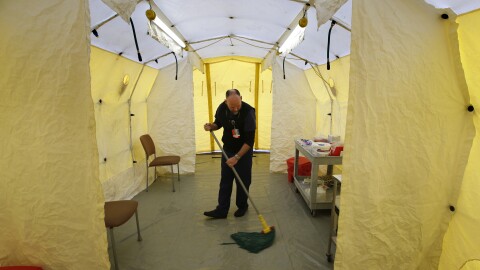The surging number of coronavirus infections across Maine is causing a perfect storm for the state’s health care providers, who could soon have to delay some non-emergency services to free up workers to treat COVID-19 patients.
The number of COVID-19 patients who need hospital care in Maine now rivals the number reached at the peak of last winter’s surge, with 71 out of the 143 hospitalized coronavirus patients requiring critical care on Friday. That ties the state’s previous record of COVID-19 patients in the ICU ON Jan. 20.
Maine CDC Director Nirav Shah said on twitter that just 39 ICU beds remain open in the state. There were also 31 COVID-19 patients on ventilators on Friday, up from 27 on Thursday.
There are some mitigating factors in this summer’s surge, most notably the fact that more than 70% of eligible Mainers have now received vaccines that prevent the most dire effects of COVID-19. But kids younger than 12 still can’t get vaccinated, and the highly contagious delta variant has spread like lightning, particularly in more rural areas with low vaccination rates.
Leaders of the state’s four largest hospital systems came together this week to warn about the crisis and plead with Mainers to take steps to prevent COVID-19 from spreading further, including social distancing, wearing face masks in public indoor spaces and getting vaccinated.
“The patients that we have right now in the ICU are some of the sickest patients that we’ve seen,” said Chris Laird, an associate vice president at Northern Light Health who works as a critical care nurse at Eastern Maine Medical Center in Bangor. “They are intubated for a long period of time, and we’re truly doing a lot to manage them and keep them alive. So, it is really difficult right now.”
At the same time, the hospital leaders say there are also some unique challenges during this surge.
Summer is always their busiest season since the state’s population swells and the demand for medical services increases. Health care providers are also trying to overcome some other challenges related to the pandemic, including staffing shortages and a backlog of patients who have put off care throughout the last 18 months.
During a virtual news conference, the hospital leaders said they may have to make some difficult decisions if the present surge continues.
Dr. Joan Boomsma, chief medical officer at MaineHealth, said that Maine Medical Center in Portland was recently able to add 10 additional ICU beds, but that it would struggle to find enough qualified nurses, respiratory therapists, and others to keep adding new ones. If new COVID cases don’t start to decline, she warned the organization might have to delay elective services such as mammograms, colonoscopies, and hip surgeries, as it did last winter.
“We’re looking at every possible contingency we can, but the real shortage and the real limitation will be some of those highly trained staff we need to take care of the most seriously ill patients,” Boomsma said.
Other hospital officials echoed those remarks. Among the additional challenges they face are staff who must stay home after possible exposures to COVID-19 and people who left the health care field because of burnout.
Health care officials in Portland and Bangor have previously made plans to open auxiliary hospitals during the pandemic, but Dr. James Jarvis, the clinical lead for Northern Light’s COVID-19 response, said that his organization is not seriously considering that possibility right now given that it would “spread staff out even further.”
In some ways, the surge already is causing ripple effects in the care that patients might get in a Maine hospital.
Both Jarvis and Dr. Steven Diaz, chief medical officer at MaineGeneral Health in Augusta, said that the flow of sick patients through their hospitals has slowed as nursing homes have to intermittently stop admitting new patients amid concerns over COVID-19 transmission.
An inpatient stay might normally last four to seven days, Diaz said, but that stay can extend to multiple weeks if a nursing home unit can’t accept them because it’s closed for COVID-19 testing. And that back-up can then reach the emergency department, where patients may have to stay boarded until there is an opening on the inpatient floor.
“So, the ED gets backed up,” Diaz said. “The bigger issue is the global action of COVID, not specifically the acute illnesses right now.”
But, Diaz added, he’s worried that the high numbers of sick patients now being seen in other parts of the U.S. could be a harbinger of the next couple weeks in Maine, particularly if residents don’t change their behavior and start taking more precautions against spreading the virus.
“Maine is always at the end of the epidemic waves,” he said.




